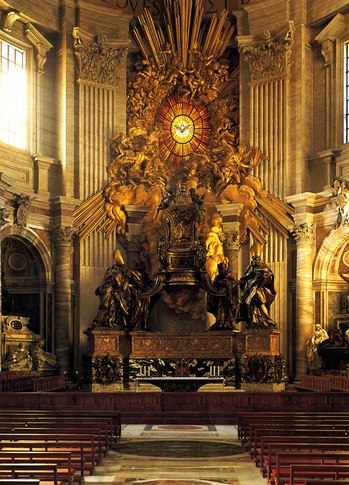With the Church we pray
Grant, we pray, almighty God, that no tempests may disturb us, for you have set us fast on the rock of the Apostle Peter’s confession of faith.
Has anyone promised you anything? As Catholics, we can say with certainty that we have been promised something. In fact, we are promised not only something, but Someone. We can identify that we have been promised the truth, happiness (in this life) and eternal life (happiness in the next life); we’ve also been promised a rich relationship with God, with Jesus, and the Holy Spirit. Today’s feast of the Chair of Saint Peter is the Church’s way of reminding God and each other that we have been promised all these things: truth, happiness, and life eternal with God.
For a very, very long time, actually since the 4th century, the Church of Rome has had a special commemoration of the pastoral, spiritual authority of Saint Peter as the rock upon which the Lord built His Church. Historians estimate that Saint Peter was executed between the years 64 and 68. In fact, the Church in Antioch, founded by Saint Peter, has also had this feast on their liturgical calendar. The witnesses found in the Apostolic Fathers, the Roman See has always held a special place in the obedience of orthodox Christian believers because of the bishop of Rome “presides in love” and in service over all the Churches of God.
Today’s feast ought to remind each one of us that we don’t celebrate furniture but it calls us to see in Peter Jesus. Each feast of a saint, including the Blessed Mother, always points to Jesus. To do otherwise would be idolatry. The Chair of Saint Peter is fundamentally about work, the mission of bishop as overseer, teacher and pastor conferred by Jesus on Peter, and continued through the ages to Pope Benedict XVI (and soon on his successor). See the Gospel of Matthew 16:13-20. What we celebrate today is the communion of faith, the truth of the faith given to us by the Lord through the apostles to the bishop of Rome and to all bishops. You may even say the feast we celebrate today is the ministry of the Church’s Magisterium located in the Roman Pontiff in that he cannot teach error. That does not mean the pope is a saint; that the pope does not sin; on contrary, we believe the pope is a sinner and in need of redemption like each one of us: he has clay feet like you and me. But having clay feet doesn’t mean that teach that we believe in “Christ, the Son of the Living God.” His job is to help us see the face of Christ in this world, and to lead us to Him so that may enjoy eternity with Him.
In 2006, Benedict XVI gave the following address on this feast which is required reading,

